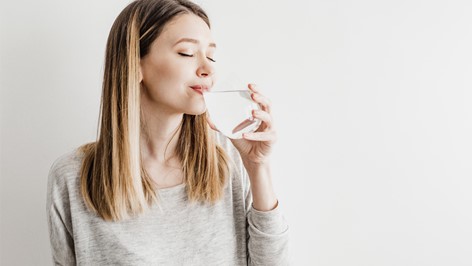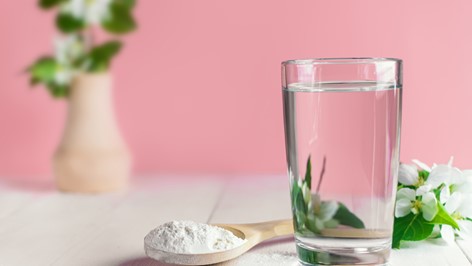Gut health: The secret to glowing skin

Is your skin looking or feeling a little lacklustre? If so, there’s a chance your gut might need some TLC. Read on to understand how our gut and skin are connected, along with a few handy (and delicious) ideas that you can add into your diet to help keep you looking and feeling incredible from within.
Gut Health and Skin. What’s the Connection?
Our gut and our skin are in constant contact and communication with each other – a link that’s known as the gut-skin axis.
The gut-skin axis is like an information super-highway where the state of the skin can change in response to alterations in the health of the friendly bacteria that naturally reside in our guts (collectively known as the gut microbiome or microbiota).
One of the functions of the gut microbiota is to aid in the breakdown of dietary fibre in the intestines. That process generates compounds called short-chain fatty acids (SCFAs), which are involved in the body’s natural anti-inflammatory mechanisms, including those affecting the skin.
The gut microbiome also influences aspects of cell-to-cell communication that drives the skin’s ongoing cycle of cellular regeneration, so it supports the skin’s moisture levels and hydration too.
Prebiotics and Probiotics for Gut and Skin Health
Both probiotics and prebiotics are beneficial in supporting good gut function, but what’s the difference? In a nutshell, probiotics are the friendly bacteria that reside in our gut, while prebiotics are a group of nutrients that provide the fuel that helps those bacteria thrive.
Both probiotics and prebiotics are important for healthy, radiant skin too, because when the gut bacteria break down prebiotic substances to provide themselves with nourishment, they produce those all-important anti-inflammatory SCFAs that we mentioned above.
Which Are the Best Probiotic Foods?
Topping up our levels of probiotic organisms is as simple as making sure we eat fermented foods on a regular basis.
Consider treating yourself to a good quality yoghurt, adding some naturally fermented pickles to your meals, or kicking back with some kombucha. You can also support your probiotic levels by taking best probiotic supplement for gut health.
Which Are the Best Prebiotic Foods to Eat?
Prebiotics are found in a wide variety of plant-based foods, especially those that are rich in certain types of fibre. Some of the best prebiotic foods to include in our diets are:
- Vegetables like garlic, onions, leeks, shallots, green peas, sweet corn, Jerusalem artichokes and asparagus, whole-grain oats and beetroot
- Grains like steel cut oats, whole grain wheat, pearl barley and rye
- Fruit, especially apples and berries
- Nuts and Seeds, like flaxseeds, pistachios and cashews
- Legumes, such as chickpeas, kidney beans, soybeans, lentils and even baked beans
If you prefer to take your prebiotics in a supplement, fructo-oligosaccharides (FOS) are a good option to choose. Their name basically means ‘carbohydrates made of chains of fructose’, and it may be hard to pronounce, but FOS are easy to take in capsules.
Which Vitamins Are Good for the Skin?
Environmental factors like ultraviolet (UV) light from the sun, air pollution and cigarette smoke can all have detrimental effects on the skin by increasing the amount of free radical activity our cells are exposed to.
Excessive free radical activity can contribute to premature skin ageing, so maintaining a healthy balance of antioxidants that support the cells’ defences against free radical damage is an important aspect of supporting the skin’s youthful appearance.
Three important best antioxidant vitamins to consider when thinking about skin health are:
- Betacarotene - which is converted to vitamin A in the body and supports the skin’s elasticity and its defences against the effects of UV light
- Vitamin C - which supports the skin’s own protective mechanisms against UV light and is essential for the production of the collagen that gives skin its strength and elasticity
- Vitamin E - which helps protect cell membranes from free radical damage and supports the skin’s ability to act as a barrier between you and the outside world
Eat Antioxidant-Rich Fruit and Vegetables for Radiant, Healthy Skin
An easy way to make sure that we’re getting plenty of antioxidants is to eat fruits and vegetables of all colours of the rainbow.
Think green leafy veggies like spinach, orange-coloured foods like carrots and sweet potatoes, and red ones such as tomatoes and watermelon.
Dark blue and purple foods like beetroot and blackcurrants are especially rich in antioxidants, so don’t forget to snack on them too!
For example, blackcurrants are naturally rich in compounds called anthocyanins (especially when they’re grown here in New Zealand!), which have both antioxidant and anti-inflammatory activity in the body. This incredible superfood also contains compounds that can have supportive benefits in the maintenance of skin health, thanks to their phytoestrogenic properties (in other words, their ability to act like oestrogen in the body).
Also consider rose hips, which are the fleshy red fruit of a specific type of rose called a dog rose. They’ve been traditionally used as medicinal compounds, and contain an abundance of antioxidants like vitamin C, carotenoids and more.
Head here to learn more about the importance of collagen and hydration for incredible skin, and why supporting a good night’s sleep should be a daily part of your skincare routine.
Always read the label. Use only as directed. Vitamin and mineral supplements must not replace a balanced diet.
Incredible tips in your inbox
By joining, I confirm that I would like to receive information about Red Seal’s products and services.






